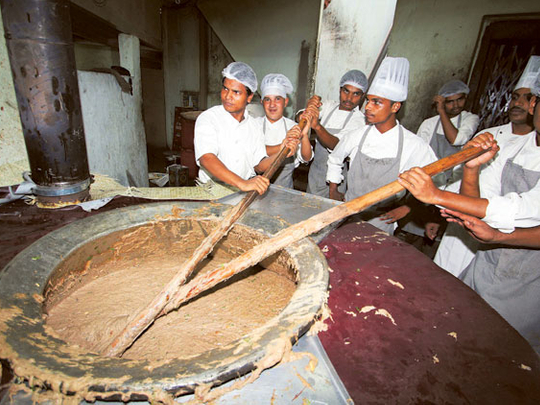
Hyderabad: In Hyderabad, the oriental city of Minarets and Nawabs in southern India, Ramadan is incomplete without Haleem, one of its most popular and delicious dishes, which has now become a Ramadan staple.
Haleem, a paste-like stew of Arabic origin, made of three Gs — Gosht (meat) Ghee (clarified butter) and Gandum or Geyahun (Wheat) — has today become an unalienable part of Hyderabadi cuisine and a raging hit.
Haleem adds to the mosaic of colours and aromas of this 400-year-old city, which is home to the enclaves of Arabs and Iranians, a reminder of centuries of cultural confluence.
As per the peculiar tradition of the city, this popular dish is served only during Ramadan, and is an essential part of iftar.
And it is not without a reason.
“It is easy on your stomach but full of nourishment and restores your energy, so a lot of people prefer to eat it,” Mohammad Rabbani, owner of Shah Ghouse hotel that sells one of the most popular haleems in the city — said.
Introduced to India by the Arabs during the reign of Qutub Shahis, the ruler of Golkonda sultanate and founders of Hyderabad, the dish underwent many improvisations and changes to find its present form and stature during the Asif Jahis or the Nizams of Hyderabad. Today, it is synonymous with Hyderabad to the extent that the Haleem Makers’ Association of Hyderabad has secured the Geographical Indication Status (GIS) from the government of India so that the brand of Hyderabadi Haleem retains its unique taste.
Come evening in the old city of Hyderabad, around the historic Charminar and Makkah Masjid, thousands make a beeline to the road side eateries and hotels for their share of haleem. No official figures are available but it is estimated that all the hotels and eateries in the city do business of Rs3 billion (Dh183 million) throughout Ramadan and generate 30,000 additional jobs.
If as a tourist you want to see and taste the real Hyderabad, Ramadan is the month to be in the city. Perhaps this is the reason why haleem is not only in great demand among a majority of the 10 million dwellers of this city but has turned in to a tourist attraction, bringing forth people from across the country just to taste this unique dish.
The aroma of haleem is not confined to the Muslims alone. With Hyderabad turning into a cosmopolitan city, as the emergence of the Information Technology sector brings a flood of young people from across the country, haleem has won their hearts too.
“The profile of haleem lovers has changed significantly. Only 30 per cent of our customers are Muslims. Haleem is loved by all,” says Mohammad Abdul Majeed, owner of the Pista House chain. The Pista House has also introduced a vegetarian version of haleem to cater to vegetarians.
One such regular is Rajesh Kumar, a software professional from Pune. “After I tasted it once in a dinner party in Hyderabad, I fell for it. I make it a point to visit Hyderabad specially during Ramadan to have relish haleem and also take it back home in a big quantity for others”, says the lanky engineer. “It is a great occasion to enjoy with friends.”
Apart from all the corners of India, haleem is spreading its aroma to many other parts of the world thanks to the entrepreneurial spirit of Majeed, who introduced many innovations to the business.
Traditionally, thousands of hotels and roadside eateries prepare the dish in earthen kilns (Bhattis). But the advent of the Pista House brand of haleem ushered in the preparation and distribution of the dish at an almost industrial level. Around 2,500 workers toil for hours on 35 kilns in old city to prepare more than 200 quintals (one quintal is 100kg) of haleem every day.
This brand’s haleem is made available through more than 200 outlets across the city and to eight major cities such as Delhi, Mumbai, Bengaluru and Kolkata through a courier service.
“We have also arranged the delivery of piping hot haleem to countries like UAE, Saudi Arabia and Singapore,” says Abdul Majeed who plans to open 20 outlets in Saudi Arabia. He has a particular focus on countries with a large Hyderabadi diaspora. “We know Hyderabadis can not survive without haleem, specially during Ramadan,” he said.
Apart from Pista House, and Shah Ghouse, the city also boasts of many other brands like, Shadab, Sarvi and 555, reputed for preparing the dish with an Iranian touch. The restaurant 555 makes it distinct by adding pieces of chicken and tongue of goats and sheep. Another innovation is fish haleem available in new part of Hyderabad.












